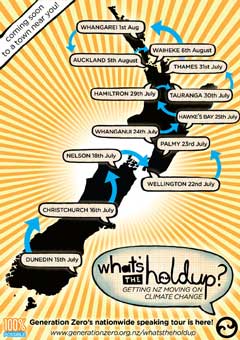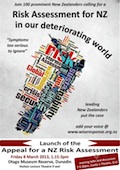 Climate change minister Tim Groser has finally got around to announcing that New Zealand’s emissions reduction target for 2020 will be a 5 percent reduction on 1990 levels — a significant step back from NZ’s previous conditional commitment to make cuts in the 10 to 20 percent range. Since the Key government refused to join the second commitment period of the Kyoto Protocol last year, this target is being adopted under the wider UN Framework Convention on Climate Change, and therefore has no penalties (or incentives) attached. Groser’s announcement claims:
Climate change minister Tim Groser has finally got around to announcing that New Zealand’s emissions reduction target for 2020 will be a 5 percent reduction on 1990 levels — a significant step back from NZ’s previous conditional commitment to make cuts in the 10 to 20 percent range. Since the Key government refused to join the second commitment period of the Kyoto Protocol last year, this target is being adopted under the wider UN Framework Convention on Climate Change, and therefore has no penalties (or incentives) attached. Groser’s announcement claims:
The target is affordable and demonstrates that New Zealand is doing its fair share to address global climate change. In deciding this target, the Government has carefully balanced the cost to New Zealand households and businesses against taking ambitious action to tackle climate change.
This is an unconditional target to take responsibility for our emissions, and gives certainty to domestic stakeholders.
Groser also claims that the new target “compares favourably with our traditional partners’ actions” — but fails to note that it’s way out of line with UK and EU commitments to cuts of 30% and 20% over the same period.
The announcement will come as little surprise in the context of recent government actions — in particular Groser’s reckless mismanagement of the emissions trading scheme, which is now leading to huge and expensive dislocation in the forestry sector.
Further context for Groser’s approach to climate policy came in a reply to a series of questions from Green Party climate spokesman Kennedy Graham at Question Time on August 8th. Asked to reconcile sanctioning a new West Coast coal mine with climate action, Groser made himself completely clear:
We will not sacrifice everything to the altar of climate change.
Failing to take climate change seriously — by failing to cut emissions and doing nothing to encourage prudent adaptation — will sacrifice the entire country to the effects of climate change. By refusing to bite the bullet, Groser and his cabinet colleagues put easy money now ahead of our future wellbeing. Or, perhaps, any future worth having.


 At the National Agricultural Fieldays earlier this month, climate change minister Tim Groser claimed that including agriculture in the emissions trading scheme would be “utter environmental and economic madness”. At The Daily Blog today,
At the National Agricultural Fieldays earlier this month, climate change minister Tim Groser claimed that including agriculture in the emissions trading scheme would be “utter environmental and economic madness”. At The Daily Blog today, 